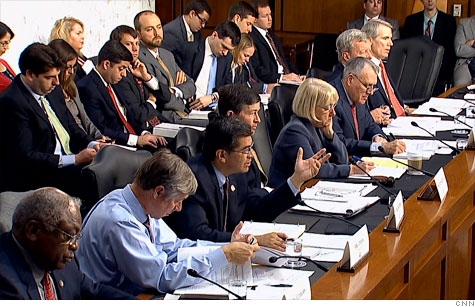
NEW YORK (CNNMoney) -- The automatic cuts looming over the congressional debt committee would take a big bite out of discretionary spending, a top government budget expert said Wednesday.
And those reductions would be felt across the economy -- potentially affecting infrastructure projects, higher education, basic research, and state and local governments, Congressional Budget Office Director Douglas Elmendorf explained to members of the so-called super committee.
That panel must propose at least $1.2 trillion in debt reduction over a decade. If it fails to do so, the budget law passed by Congress in August would require across-the-board cuts to certain parts of the federal budget.
As a result, by 2021, defense spending would be slashed to a level 16% lower than it would be if it simply kept pace with inflation, and nondefense discretionary spending would be 15% lower, Elmendorf said.
The focus of Elmendorf's testimony was discretionary spending, which constitutes less than half of the federal budget and is already subject to other spending curbs under the Budget Control Act passed this summer.
Project Compromise: Time for Congress to do right
"Lawmakers have already taken significant steps to constrain discretionary spending," he said.
The prospect that discretionary spending would grow far below inflation understates how some programs would be affected.
For example, Elmendorf said, spending on veterans' health care and Pell grants for higher education has been growing faster than inflation.
"Lawmakers have already taken significant steps to constrain discretionary spending," he said.
The prospect that discretionary spending would grow far below inflation understates how some programs would be affected.
For example, Elmendorf said, spending on veterans' health care and Pell grants for higher education has been growing faster than inflation.
CNN
No comments:
Post a Comment